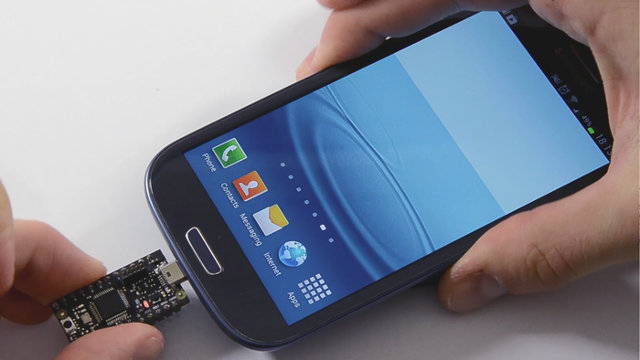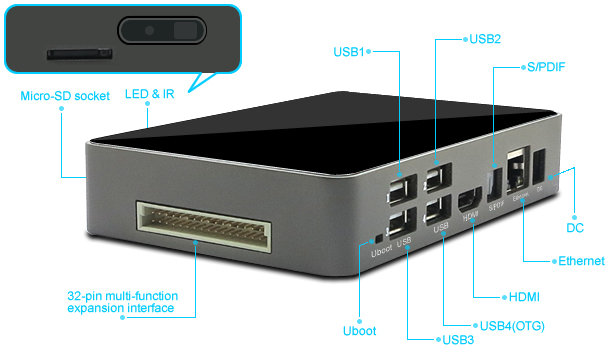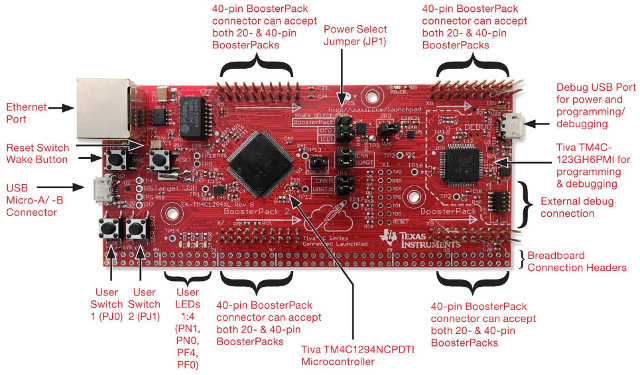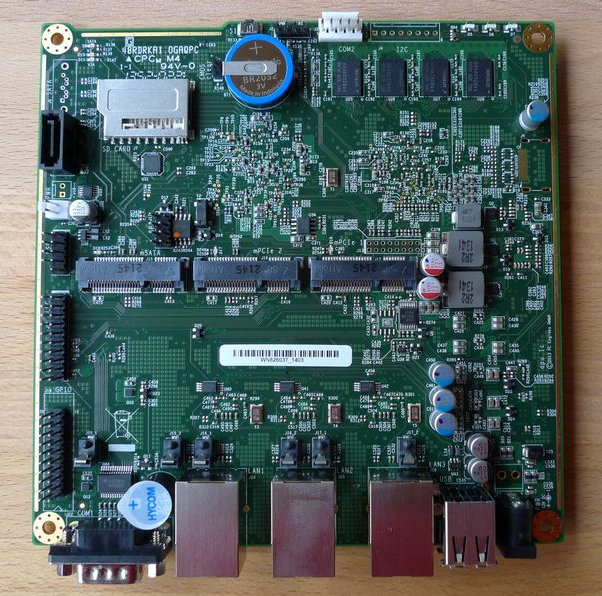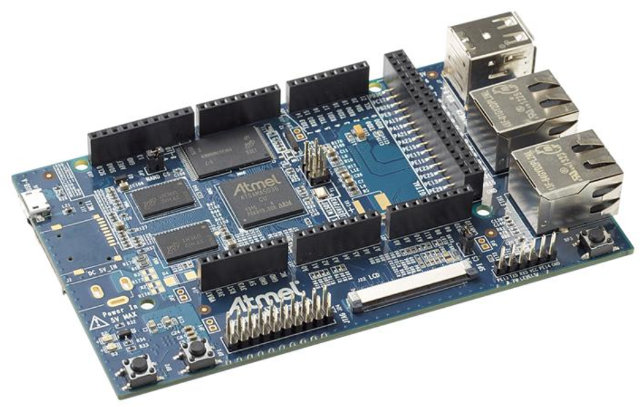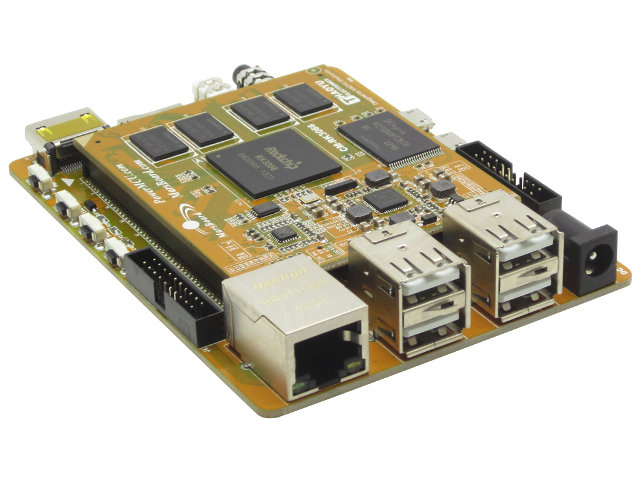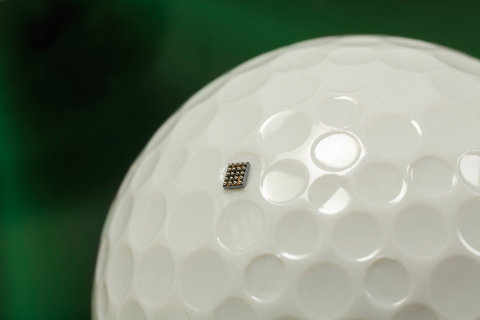Many MCU based development boards such as Arduino or mbed platform connect to a computer via USB for power and programming, at least during the development stage. USB2Go, however, is designed with a micro USB port to connect directly to your Android smartphone, although it can also be used for standalone project, and an Arduino compatible baseboard is also available. This board powered by an STM32 ARM Cortex M3 MCU is however mainly destined to interface hardware such as LED, servos, sensors to your smartphone via micro USB providing both power and a communication channel with your Android device. USB2Go hardware specifications: MCU – STMicro STM32 ARM Cortex M3 MCU @ 72 MHz with 128 KB Flash, 64 KB SRAM USB – Micro USB for power and programming Headers – 2x 12 pin headers giving access to GPIO, ADC, PWM, UART, I2C, SPI… Debugging I/F – JTAG 20-pin to SWD […]
ITEAD Studio IBOX Powered by AllWinner A20 Features a 32-Pin Hacker-Friendly Connector (Crowdfunding)
ITEAD Studio IBOX is a mini computer powered by AllWinner A20 dual core Cortex A7 processor with 1GB RAM and 4GB Flash, a few USB connectors, Ethernet and video/audio connector. This mini pc can run both Android & Linux, and features a 32-pin connector that allows to connect expansion boards. Let’s have a look at the specifications: SoC- AllWinner A20 dual core ARM Cortex-A7 @ 1 GHz + ARM Mali 400 MP2 System Memory – 1GB DDR3 RAM Storage – 4GB NAND Flash + microsd slot Video Output – HDMI Audio Output – HDMI, optical S/PDIF Connectivity – 10/100M Ethernet USB – 3x USB 2.0 host port, 1x USB OTG port (full size) Expansion – 32-pin proprietary connector with TV OUT, USB, LCD, UART, IR, CSI, SPI, SATA, GPIOS and power signals. Misc – LED , IR sensor, and U-boot button (FEL mode?) Power – 5V/2A 9V/2A Dimensions – 145 x […]
Texas Instruments Tiva C Series TM4C1294 Connected Launchpad Sells for $20
There are now many ultra low cost MCU development kit selling for $15 to $25 such as STMicro Discovery Board, but for this price, they’ll usually just feature the MCU, a micro USB, pin header, maybe and maybe some sensors, and they usually lack any form of connectivity, at least without extra hardware. With Tiva C Series TM4C129 Connect Launchpad, Texas Instruments brings a board that can be used for IoT application out of the box thanks to the addition of an Ethernet port. The board sells for just $19.99, which means you could easily make something like a connected 4-relay control system for about $25. Connected LaunchPad evaluation kit specifications: MCU – Texas Instruents TM4C1294NCPDT ARM Cortex-M4 @ 120MHz with floating point, 1MB Flash, 256KB SRAM, 6KB EEPROM, Integrated 10/100 Ethernet MAC+PHY, data protection hardware, 8x 32-bit timers, dual 12-bit 2MSPS ADCs, motion control PWMs, USB H/D/O, and many […]
PC Engines APU System Boards Feature AMD G-Series T40E APU, 3 Gigabit Ethernet Ports
Up to now there were basically two embedded board based on x86 architecture available to hobbyists: Gizmo Board (AMD T40E) and Minnowboard (Intel Atom). There’s now another solution with PC Engines system boards, namely APU.1C and APU.1C4, that comes with AMD G-Series T40E dual core APU, 2 to 4 GB RAM, 3 Gigabit Ethernet ports, an mSATA connector, and more. Contrary to the other two boards however, there’s no video output, and that makes these APU boards suitable for routers, firewalls, VOIP, dedicated servers, special purpose network plumbing, etc.. PC Engines APU boards specifications: APU – AMD G -Series T40E dual core APU @ 1 GHz with 64 bit support, 32K data + 32K instruction + 512KB L2 cache per core, with Radeon HD6250 GPU. System Memory APU.1C – 2 GB DDR3-1066 DRAM APU.1C4 – 4 GB DDR3-1066 DRAM Storage – SD card (connected through USB), m-SATA, and one SATA […]
$79 Atmel ATSAMA5D3 Xplained Arduino Compatible, Open Source Hardware Board Powered by SAMA5D3 ARM Cortex-A5 Processor
A few days ago, at Embedded World 2014, Atmel has unveiled ATSAMA5D3 Xplained evaluation board based on SAMA5D36 ARM Cortex A5 micro-processor with 256 MB DDR2, 256 MB flash and numerous ports and expansion connectors, that targets industrial automation, networks, robotics, control panels and wearable applications. Atmel is one of the rare companies that provides support for the latest long term kernel (3.10) and mainline for their embedded solutions, and their latest board is fully open source hardware. Let’s have a look at the board specifications: MPU – Atmel SAMA5D36 Cortex-A5 Microprocessor @ 536 MHz System Memory – 2GBit DDR2 (Micron) Storage – 2GBit Flash (Micron), SD/MMCPlus 8-bit Card slot, 1x Micro SD Card 4-bit slot footprint (meaning not soldered) Connectivity – 1x Ethernet 10/100/1000M, 1x Ethernet 10/100M USB – 1x micro USB Device connector, 2x USB Host connectors Debugging – 1x 6-lead 3V3-level serial port, 10-pin J-TAG connector Expansion […]
$60 MarsBoard RK3066 (Partially) Open Source Hardware Development Board Supports Android & PicUntu
Until now if you wanted a low cost Rockchip development board you’d have to go with Radxa Rock (Quad core RK3188) or WaxBerry Pi2 (Dual core RK3066). Thanks to Haoyu Electronics , the company who made MarsBoard A10, there’s now another option with MarsBoard RK3066 powered by Rockchip RK3066 dual core Cortex A9 SoC with 1 to 2 GB RAM, 4 to 8 GB Flash and lots of ports and expansion connectors. MarsBoard RK3066 is composed of a baseboard (SOM-RK3066) and a computer on module (CM-RK3066) with the following specifications: CM-RK3066 Computer-on-Module: SoC – Rockchip RK3066 dual core ARM Cortex A9 @ 1.6Ghz + Mali-400MP4 GPU System Memory – 1GB DDR3 SDRAM up to 2GB Storage – 4GB Nand Flash & eMMC FLASH Power Management Unit – TPS659102 Misc – TX indicator LED use for debug, Power Indicator LED 10/100M Ethernet PHY – LAN8720A SOM-RK3066 Baseboard: Storage – micro SD […]
Linaro 14.02 Release with Linux Kernel 3.14 and Android 4.4.2
Linaro 14.02 has just been released with Linux Kernel 3.14-rc3 (baseline), Linux Kernel 3.10.30 (LSK), and Android 4.4.2 r2. There are been a lot of patches for Linaro members boards, and including the latest GTS big.LITTLE processing patch, as well as speeds up to Android 4.4 performance. There’s also a Linux image (password protected) for Huawei D01 board with a 16-core ARM Cortex A15 @ 1.5 GHz SoC with up to 64 GB memory, that must be an unannounced SoC for base stations or other network equipment. This month Linaro also made two important announcements: Qualcomm is now a Linaro member, and the Linaro Security Working Group (SWG) has been setup to develop open source secure software for the ARM architecture. The first projects will be reference implementations of the W3C Embedded Media Extension (EME), and secure boot for the 64-bit ARM Cortex-A series processors. They’ll also work on security […]
Meet Freescale Kinetis KL03, the Smallest Ever ARM MCU
Last year at Embedded World 2013, Freescale announced Kinetis KL02, an ARM Cortex M0+ MCU measuring just 1.9 x 2.0mm. Customer must have complained that it’s not small enough, as the company has just unveiled Kinetis KL03 MCU, 15% smaller or 1.6 x 2.0 mm, at Embedded World 2014. Just like its predecessor KL03 targets space-constraint IoT applications such as ingestible healthcare sensing, portable consumer devices, remote sensing nodes, and wearable devices. Kinetis KL03 MCU features include: 48 MHz ARM Cortex-M0+ core, 1.71-3.6V operation Bit manipulation engine for faster, more code-efficient handling of peripheral registers 8 to 32 KB flash memory, 2 KB RAM, 8K ROM with on-chip boot loader High-speed 12-bit ADC Internal voltage reference for high ADC accuracy High-speed analog comparator Up to 22 GPIOs with pin interrupt support Low-power UART, SPI, I2C (high speed) Low power wake up Secure real time clock Timers for a broad range of […]


